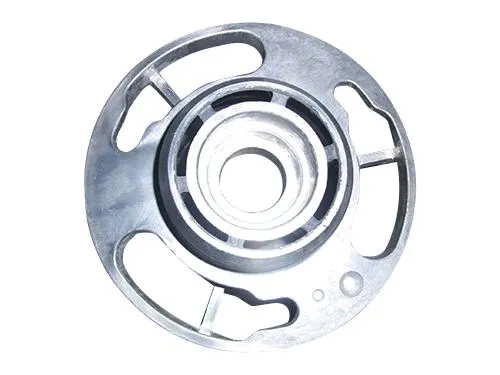Five Surface Treatments for Aluminum Alloy Die Casts
1. Aluminum phosphating
Guanidine nitrate has features of good water solubility, small amount and rapid film forming, which is an effective accelerator for aluminum phosphating. Fluoride can accelerate the forming of the film, increase film's weights and refine grains; Mn2+ and Ni2+ can obviously refine grains and make phosphating film even and compact as well as improve appearance of phosphating film; when concentration of Zn2 + is low, the film can not be formed or the film is poor; with the increase of Zn2 + concentration, film's weight also increases; the PO4 content has a great influence on weight of phosphating film and increasing the PO4 content can add more weight to phosphating film.
2. Alkaline electropolishing of aluminum
Adding appropriate additives to NaOH solutions can have good effects of polishing. After NaOH solutions of glucose being electropolished by dc constant voltage under some condition, reflectivity of aluminum surfaces can reach 90%. Using the pulse-electropolishing process can have the effect of leveling, but the leveling speed is relatively slow.
3. Environmental chemical polishing of aluminum and aluminum alloy
The main role of nitric acid in aluminum chemical polishing is to restrain pitting corrosion and to improve brightness of polishing. Adding special substances in nitric acid should be able to restrain pitting corrosion and to slow down overall corrosion; meanwhile, good leveling and brightness can be obtained.
4. Electrochemical surface strengthening treatment of aluminum and its alloy
The technical research result shows that in the Na_2WO_4 neutral mixed system, concentration of film forming accelerator is from 2.5 to 3.0g/l; concentration of complexing film former is from 1.5 to 3.0g/l; concentration of Na_2WO_4 is from 0.5 to 0.8g/l; the density of the peak point current is from 6 to 12A/dm2; slightly stirring the solutions can obtain complete, uniform and glossy gray series of inorganic non-metallic film. The thickness of the film is from 5 to 10μm and the microhardness is from 300 to 540HV; the film has good corrosion resistance. The neutral system can well adapt itself to aluminum alloy and film can be formed well on various kinds of aluminum alloys such as rust-proof aluminum and forging aluminum.
5. Surface treatment technology of YL112 aluminum alloy
YL112 aluminum alloys are widely used for structural parts of automobiles and motorcycles. There should be surface treatment for YL112 aluminum alloy so as to improve its corrosion resistance and to form surface layers that easily bond with organic coatings.
Guanidine nitrate has features of good water solubility, small amount and rapid film forming, which is an effective accelerator for aluminum phosphating. Fluoride can accelerate the forming of the film, increase film's weights and refine grains; Mn2+ and Ni2+ can obviously refine grains and make phosphating film even and compact as well as improve appearance of phosphating film; when concentration of Zn2 + is low, the film can not be formed or the film is poor; with the increase of Zn2 + concentration, film's weight also increases; the PO4 content has a great influence on weight of phosphating film and increasing the PO4 content can add more weight to phosphating film.
2. Alkaline electropolishing of aluminum
Adding appropriate additives to NaOH solutions can have good effects of polishing. After NaOH solutions of glucose being electropolished by dc constant voltage under some condition, reflectivity of aluminum surfaces can reach 90%. Using the pulse-electropolishing process can have the effect of leveling, but the leveling speed is relatively slow.
3. Environmental chemical polishing of aluminum and aluminum alloy
The main role of nitric acid in aluminum chemical polishing is to restrain pitting corrosion and to improve brightness of polishing. Adding special substances in nitric acid should be able to restrain pitting corrosion and to slow down overall corrosion; meanwhile, good leveling and brightness can be obtained.
4. Electrochemical surface strengthening treatment of aluminum and its alloy
The technical research result shows that in the Na_2WO_4 neutral mixed system, concentration of film forming accelerator is from 2.5 to 3.0g/l; concentration of complexing film former is from 1.5 to 3.0g/l; concentration of Na_2WO_4 is from 0.5 to 0.8g/l; the density of the peak point current is from 6 to 12A/dm2; slightly stirring the solutions can obtain complete, uniform and glossy gray series of inorganic non-metallic film. The thickness of the film is from 5 to 10μm and the microhardness is from 300 to 540HV; the film has good corrosion resistance. The neutral system can well adapt itself to aluminum alloy and film can be formed well on various kinds of aluminum alloys such as rust-proof aluminum and forging aluminum.
5. Surface treatment technology of YL112 aluminum alloy
YL112 aluminum alloys are widely used for structural parts of automobiles and motorcycles. There should be surface treatment for YL112 aluminum alloy so as to improve its corrosion resistance and to form surface layers that easily bond with organic coatings.
